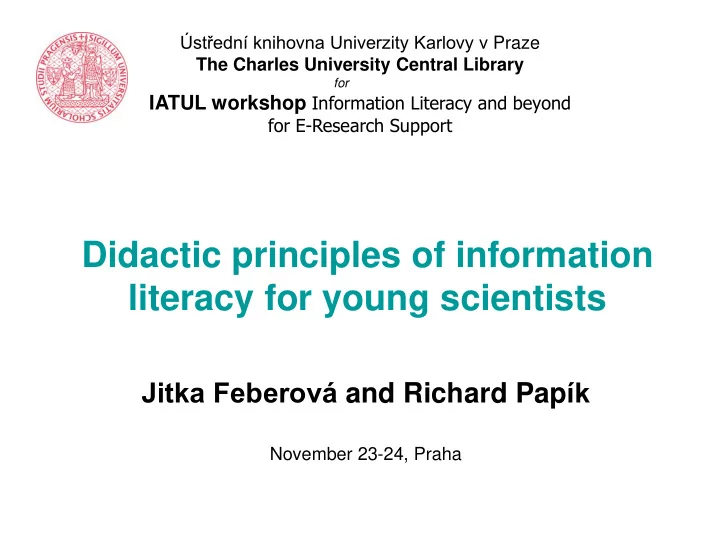

Ústřední knihovna Univerzity Karlovy v Praze The Charles University Central Library for IATUL workshop Information Literacy and beyond for E-Research Support Didactic principles of information literacy for young scientists Jitka Feberová and Richard Pap ík November 23-24, Praha
The more we study, the more we know the more we know, the more we forget, the more we forget, the less we know, why do we study? I don ’ t know.
Knowledge is of two kinds: we know a subject ourselves, or we know where we can find information upon it. Samuel Johnson, 1709-1784
Common denominator Young scientists + IL educators + librarians __________________________________ ?
Faculties • Catholic Theological Faculty • Protestant Theological Faculty • Hussite Theological Faculty • Faculty of Law • First Faculty of Medicine • Second Faculty of Medicine • Third Faculty of Medicine • Faculty of Medicine in Plzeň • Faculty of Medicine in Hradec Králové
Faculties • Faculty of Pharmacy in Hradec Králové • Faculty of Arts • Faculty of Science • Faculty of Mathematics and Physics • Faculty of Education • Faculty of Social Sciences • Faculty of Physical Education and Sport • Faculty of Humanities
University Institutes • Institute of the History of Charles University and Archive of Charles University • Center for Theoretical Study • Center for Economic Research and Graduate Education • Environment Center
Other Units • Computer Science Centre • Institute for Language and Preparatory Studies • Central Library of Charles University • Centre for Transfer of Knowledge and Technology • Agency of the Council of Higher Education Institutions
Services Facilities • Dormitories and Refectories • Archbishop’s Seminary • Karolinum Press • Premises and Facilities Administration • Sports Centre
“TTD” Charles University is currently home to more than 53,000 students - about one-sixth of all people studying in the Czech Republic. It offers over 300 accredited degree programmes in 642 fields
“TTD” more than 20,000 undergraduates are studying for Bachelor's degrees, with almost 25,000 students enrolled in Master's programmes
“TTD” and 8,000 in doctoral programmes. More than 7,000 of the University’s students come from abroad.
“TTD” Every year almost 9,000 people graduate from Charles University; our graduates traditionally enjoy one of the highest employment rates of any population segment in the Czech Republic. Every year, a further 16,000 people complete one or more of the University’s various lifelong learning courses.
Charles University is one of the best-performing educational institutions in the Czech Republic. According to the Academic Ranking of World Universities , it ranks among the top 2 per cent of higher education institutions worldwide.
… So how can we start with the IL?
outside of university, e.g. mixture, value high school added, librarians students researchers, bachelor, masters scientists, teachers
Inspiration from EBM ( evidence- based medicine? Information services, such is information literacy? 1. Pull 2. Push 3. Prompt
Frontal teaching E-learning, online learning Blended learning
Didactic principles of information literacy for young scientists, researchers and also university teachers General principles: Principle of activity Principle of awareness Principle of scientism
Didactic principles of information literacy for young scientists, researchers and also university teachers Principle of progressiveness Principle of the connection between theory and practice Principle of proportionality
Didactic principles of information literacy for young scientists, researchers and also university teachers Principle of individual approach Principle of emotions Principle of permanency
Didactic principles of information literacy for young scientists, researchers and also university teachers Principle of clearness Principle of consistency Principle of feedback
Archive of ITU : http://www.itu.int/itudoc/itu- d/wtdc/wtdc1994/speech/gore.txt
… and the end of speech
Perspective profession: information specialist / information literacy educators
From one laboratory ;-) : Theory is when you know everything but nothing works. Practice is when everything works but no one knows why. In our lab, theory and practice are combined: nothing works and nobody knows why.
Literature related to didactic principles, e.g: DOSTÁL, Jiří. Učební pomůcky a zásada názornosti . Olomouc : Votobia, 2008. ISBN 978-80-7220-310-9. MALACH, Josef. Základy didaktiky . Ostrava : Ostravská univerzita v Ostravě, 2003. ISBN 80-7042-266-1. Kapitola Zásady procesu vyučování - učení se.
Thank you
Recommend
More recommend